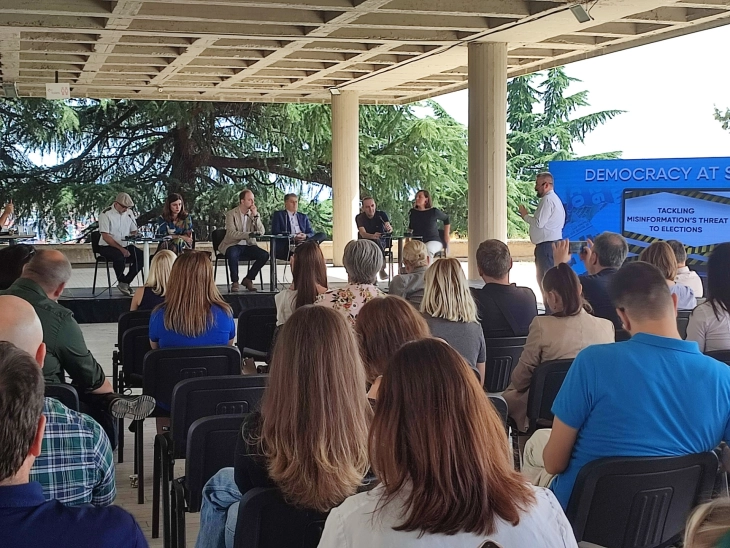Debate on tackling fake news - 70 percent of Macedonian citizens likely to believe misinformation
- Misinformation and fake news are a threat and negatively affect the work of media professionals. Their spread is also a threat to elections. It is very important to strengthen media literacy in North Macedonia, as well as everywhere else in the world, UNDP Resident Representative to North Macedonia, Armen Grigoryan, told Wednesday's debate "Democracy at Stake: Tackling Misinformation's Threat to Elections", organized by the United Nations Development Programme (UNDP).

Skopje, 14 September 2023 (MIA) - Misinformation and fake news are a threat and negatively affect the work of media professionals. Their spread is also a threat to elections. It is very important to strengthen media literacy in North Macedonia, as well as everywhere else in the world, UNDP Resident Representative to North Macedonia, Armen Grigoryan, told Wednesday's debate "Democracy at Stake: Tackling Misinformation's Threat to Elections", organized by the United Nations Development Programme (UNDP).
Up to 70 percent of Macedonian citizens, he said, are likely to believe misinformation without first verifying the source, compared to Finland's 10 percent, for example.
Stressing the importance of this topic also due to the exposure of Macedonian citizens to misinformation ahead of the upcoming elections, he said a decision has been made that a debate on media literacy and tackling misinformation and fake news is the best way to mark the International Day of Democracy.
Grigoryan noted that the strength of democratic processes depends on informed citizens resilient to misinformation, adding that UNDP's efforts will not end with today's debate, but a project entitled "Miss the Misinformation" will kick off.
"UNDP decided to launch a project-initiative that aims to tackle fake news and misinformation. Amid a wrecked media environment, this project will attempt to strengthen local communities so that they become more resilient to the spread of misinformation. It is important that this project stretches outside of Skopje," Grigoryan said.
President of the journalists' association (AJM), Mladen Chadikovski, said this was a very important topic that affects the whole society, but above all, journalists, because spread of misinformation also lowers the trust people have in media and journalists.
"We encounter misinformation every day, on every level, sometimes we recognize it, other times not enough and that is why it is important to raise awareness and become more prepared the next time we fight the battle against misinformation, which should be every day," Chadikovski said.

He believes that in times of fast-flowing information, especially on digital platforms, the media profession finds itself at a "critical crossroad", and therefore, "we cannot sit and silently observe something that is happening up in the clouds of misinformation." Regardless of whether they are intentional or not, Chadovski added, misinformation threatens journalists, the trust in media, and has a dangerous tendency to divide people, and different communities as well.
"We have to find stronger and more effective tools in the fight to distinguish information and misinformation. We are constantly moving in a field where facts can be blurred, truths can be manipulated and half-truths even more so, where misinformation spreads fast, sometimes even faster than verified information," Chadovski stressed.
Journalists, experts and activists, attended the panel discussion where the focus was put on online media outlets, which in the race for clicks and profit, publish unverified information with the source most often being other social media.
Journalist Meri Jordanovska agrees that as a global phenomenon, misinformation is most commonly found in online spaces.
"It cannot be stopped, or be debunked, because online sites pass it around and add more to it, etc. Online spaces are absolutely the reason for it," Jordanovska said.
She also expressed her disappointment that an online media outlet, "a synonym for misinformation that spread serious information and created fake news, and damaged people," and whose owner received a court order and was banned from working, reopened yesterday, under the same name, but this time registered in the United Kingdom and the United States.
Journalist Nazim Rashidi said that compared to online media, traditional media, especially TV, have channels to verify all information that gets posted.
"This offers a guarantee that there is still some respect in traditional media because all information has to be verified. Because social media create an illusion of what news is, we have to keep reiterating that journalism is a system of values. It is not only freedom of speech, journalism is so much more than that," Rashidi noted.

Communication science professor Sead Xhigal pointed out that media are important as one of the pillars of democracy that allows citizens to be active. In this process, he added, professional media are a key component to provide citizens with timely, accurate and precise information thus enable insight in society.
"According to all research in the past 10 years, we are, unfortunately, at the bottom of all European countries in terms of the media literacy index. No matter the amount of academic or expert debates, our social reality shows that most of our citizens will click on a title "iPhone for Mden 114." We need media literacy, which is not sufficiently developed and needs to be strengthened in formal education, civil sector, and institutions," Xhigal said.ssh/nn/
Photo: MIA







